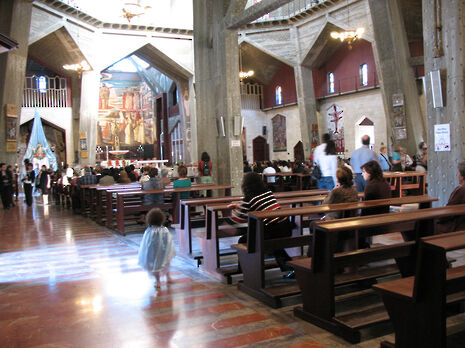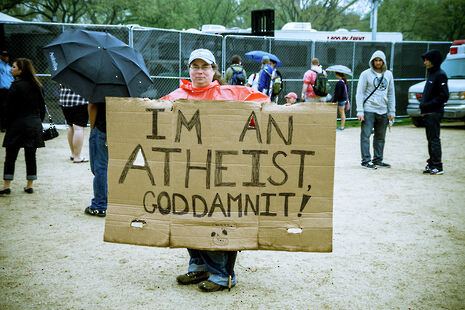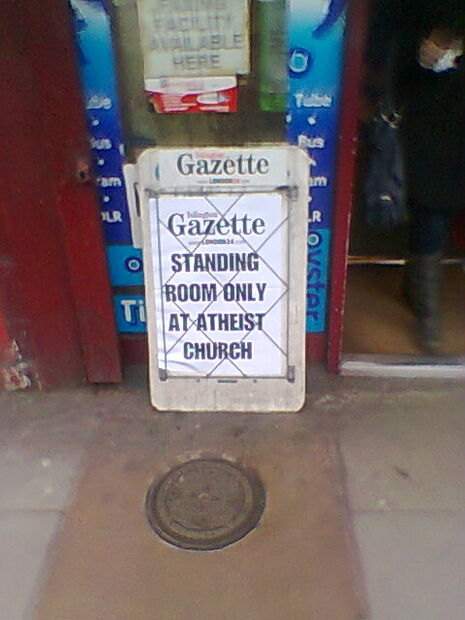Debate: Can an Atheist Church ever work?
Head of the Cambridge Inter-collegiate Christian Union Alex Greaves and outspoken Atheist Silas Lee discuss the founding of a church for atheists in Cambridge

Alex Greaves – Head of the Cambridge Inter-collegiate Christian Union
You might expect Christians to be up in arms at the arrival of a new, atheist church in Cambridge. However, I’m not surprised at all. Partly because it is nothing new: the concept of religion for atheists is at least as old as August Comte’s Religion of Humanity, founded in the fallout of the French Revolution – an anticlerical, atheistic movement that reverenced philosopher-saints. More locally, there already exists a plethora of secular societies in Cambridge: the Cambridge University Atheist and Agnostic Society (CUAAS), Sceptics in the Pub, the Cambridge Humanist Group (which assembles on Sunday mornings) and many more. This pervasive urge to gather in communities is something that, as a Christian, I would expect. I believe that we were made with good desires for community and inter-dependence.
What stands out about the Sunday Assembly is its self-conscious imitation of Christian churches, apparently following thinkers like Alain de Botton’s call for atheists to reclaim the best bits of religion, buffet-style. However, the Sunday Assembly seems to have struggled in locating these best bits. As a frequent church-goer, highlights do not include either the tea and coffee (frequently grey and indistinguishable), or the singing (atonal and arrhythmic – like karaoke with your fifty year-old uncle and your five year-old niece, except there are two hundred of them and they’re not your relatives). And who wants a Sunday morning lecture? Taken in isolation or even in combination, these elements of a church service can appear uninteresting, even laughable.

There is lots I believe is great about churches (even the coffee and the singing!), but only when they stay connected to their foundation: the generous love of God, who recognises our flaws but still desires relationship with us. It is only in light of this extraordinary mercy that a church can build the genuine, warm and transformative community that the Sunday Assembly is trying to imitate, a place where people with different backgrounds and painful histories can be united by love, purpose and hope; where humanity is neither discarded as a “nothing”, nor falsely elevated.
True community can only flourish where human beings are both thought to have intrinsic value and their inherent brokenness is acknowledged and accounted for. Without this, there is either oppressive manipulation by the powerful or disillusionment as we are let down by others and let others down. God’s mercy navigates a church between this Scylla and Charybdis. I cannot see where the Sunday Assembly will find its bearings.
There is much that I affirm in the Sunday Assembly’s Public Charter: their desire to impact their community, for example, their financial openness, and their aim to be “a place of love that is open and accepting”. Yet, I fear that in their search for loving community, they have mistaken the trimmings for the Sunday roast, and that by merely adopting Christian habits, they will find themselves disappointed. If the Sunday Assembly is really interested in borrowing from Christianity, then I suggest they look again at its unique and compelling explanation of the human condition.

Silas Lee – an Atheist's perspective
Life. That’s pretty much where it’s all at for atheists. Without the prospect of life after death it follows that we lack the guidance of a church to direct us from the prospect of mortality to whatever after-life religion offers. In response, the Sunday Assembly, a self-defined “godless congregation”, looks to offer the church experience to atheists without the faith aspect.
This is not new territory. Assembly founders, Pippa Evans and Sanderson Jones, have referred to the ‘ethical unions’ of the 1800s – godless, ethical groups – as a similar initiative but said that they petered out relatively quickly. Is there something lacking in atheism, then, that defies the efforts of community?
Atheism certainly leaves a lot to be desired. If the Sunday Assembly can counter our apparent lack of belief, available/credible moral guidance, community and opportunity for reflection then I think it is more than just a good idea. Is this a genuinely feasible goal? Atheists do lack the obvious god-factor that binds religious people together. However, this has hardly formed particularly strong bonds between Jewish, Christian and Muslim people throughout history. Regardless, the question still remains, can atheism offer enough to form a tightly knit community?
The rise of an atheist church offers the chance to determine our own doctrine. We can draw on religion, and integrate modern and ancient philosophy. Throw in some meditation, mindfulness and community spirit, and you have a recipe for real fulfilment and empowerment. For centuries, religious people have been empowered by faith. I don’t think we need a god for that. It is high time we empowered each other through community.

We are currently faced with some seriously threatening global issues that beg a collective response. On the one hand we are using the Earth’s resources at an unsustainable rate and warming the Earth’s climate to dangerous levels. On the other hand globalised companies play divide and conquer with the Earth’s citizens. Our loss of community disenfranchises us. While mostly free to make choices that would avoid catastrophe, we lack the empowerment that strong progressive communities would provide in order to follow through with an alternative and sustainable lifestyle. An atheist church could facilitate discussion and support positive decision making.
So why base a godless community on the church at all? Well, maybe because it works. For thousands of years communities have supported each other and held together through religious belief. It’s a shame that a lack of belief in God excludes so many of us from this. Let’s end the diatribe against atheists that labels them as non-believers and as empty.
I believe in the power of the human mind. It doesn’t matter that I also believe in an eternal nothingness that’s waiting to engulf us all. In fact, all the better. Let’s huddle together like cavemen in a church that was meant for ‘believers’, and share between us the burden of our inevitable and inconceivable end. And while we’re at it, we may as well save the world.
 Features / Should I stay or should I go? Cambridge students and alumni reflect on how their memories stay with them15 December 2025
Features / Should I stay or should I go? Cambridge students and alumni reflect on how their memories stay with them15 December 2025 News / Cambridge study finds students learn better with notes than AI13 December 2025
News / Cambridge study finds students learn better with notes than AI13 December 2025 Comment / The magic of an eight-week term15 December 2025
Comment / The magic of an eight-week term15 December 2025 News / Uni Scout and Guide Club affirms trans inclusion 12 December 2025
News / Uni Scout and Guide Club affirms trans inclusion 12 December 2025 News / News In Brief: Michaelmas marriages, monogamous mammals, and messaging manipulation15 December 2025
News / News In Brief: Michaelmas marriages, monogamous mammals, and messaging manipulation15 December 2025









